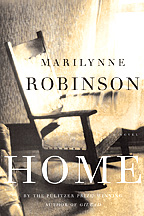BAM: You studied writing at Brown with novelist John Hawkes, who taught at Brown for decades and whose fiction some would describe as not only secular, but even profane. Is it?

Marilynne Robinson: I didn't read John Hawkes while I was in college. He didn't encourage us to model our writing on his, and I didn't want to be unduly influenced by his books—I was a sophomore at the time, and he was a very impressive teacher. I did read them in graduate school, and I was impressed to realize how good a guide he had been for me, helping me toward a kind of work very different from his.
I am not really at ease with words like "secular" and "profane." The whole vocabulary of judgment seems crude to me, especially applied to art. John Hawkes made other choices than I have made, or he was moved by other preoccupations. He was a serious, intense writer to whom I will always feel much indebted.
BAM: What did you learn from John Hawkes about writing?
Marilynne Robinson: He told me what I was doing right and helped me to develop it. He was emphatically clear on the subject of fakery, and made me very aware that I had to learn to eliminate it from my fiction. His sensitivity to rhythm, sonority, precision of language, etc., was wonderful.
BAM: In Gilead, we see the prodigal son Jack Boughton through the harsh eyes of his father's closest friends, Rev. John Ames, and in Home, as Jack's sister Glory begins to trust her brother, he emerges as a complex, vulnerable, and even admirable character. Did your feelings toward Jack change as you wrote these two novels?
Marilynne Robinson: Ames is not so much harsh as anxious. He has suffered with old Boughton through all the sorrow Jack has caused him. Now he is afraid that Jack toys with the thought of involving himself with his own wife and son after his death. The sermon he gives when Jack comes to church is regrettable on one level, because it makes Jack feel he has suffered a public embarrassment. But the actual words of it—"some people are a wilderness unto themselves, but that is God's wilderness, too, and there are angels there also"—mean that he is thinking of Jack as within the regime of grace. In other words, his view of him is not simply harsh. My own sense of Jack didn't change. Through the writing of both books I felt very strongly that I knew him.
Interview by Charlotte Bruce Harvey '78




